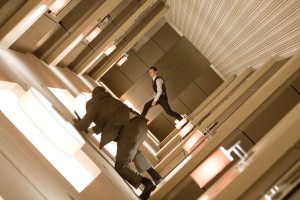By Stan Heaton
I’ve been excited about this movie for a long time. After Christopher Nolan’s success with The Dark Knight, I couldn’t wait to see what he would dream up next. And with Inception, he doesn’t disappoint. The basic concept is that dreams can be shared, and because they can be shared, the dreamer’s subconscious is susceptible to attack. This is where Cobb (Leonardo DiCaprio) comes in. He specializes in navigating the mind, and he is the best in the world at training the subconscious to resist attack.
Training minds and stealing ideas from people while they dream is really just child’s play for Cobb and his team. The real challenge is planting an idea in someone else’s head without them realizing where the idea comes from—a process called inception. The plot is full of twists, turns, and a few good secrets, so I won’t ruin the movie by belaboring the narrative. The important detail to know is that an energy mogul named Saito (Ken Watanabe) wants Cobb and his team to perform inception on the heir to a rival energy empire.
The movie becomes extremely interesting once Cobb agrees to Saito’s plan in an effort to return to his family. Making up Cobb’s team is an architect named Ariadne (Ellen Page) who builds the dreamscape. Not only is she a good reference to Greek mythology, she also plays a vital role in pushing Cobb to deal with his past.
Also on the dream team are Arthur (Joseph Gordon-Levitt) and Eames (Tom Hardy) who effectively comprise the badass portion of the group. And finally, there’s a chemist, Yusuf (Dileep Rao), whose responsibility it is to make sure that sleep is deep and long enough to give the team ample time to plant the idea. After extensive planning and practice, which is only a prelude to the real fun of the movie, Cobb and company infiltrate Robert Fischer, Jr.’s (Cillian Murphy) mind.
What follows is some very intelligent filmmaking and an extremely entertaining hour or so of action and discovery. Cobb’s team plans to use dreams within dreams to go deep enough into Robert’s subconscious to make it seem like the idea came from within the energy heir. As Cobb says to his team while on the top level of Robert’s mind, “Downward is the only way forward.”
This line is perhaps more apropos than Nolan realized. Nolan’s idea about planting an idea in someone’s head is not new. Alain Resnais had this same idea in 1961 with Last Year at Marienbad, though the method in Resnais’s film is far different than the method in Inception. For this reason, and others, it’s hard to see Nolan as a visionary on the level of Stanley Kubrick or Alfred Hitchcock.
However, what Nolan does better than many other directors today is connect themes in his movies to the art of filmmaking. He is able to anchor the action on screen to the techniques that make movies unique and fascinating. In other words, “downward,” into the depths of how films make meaning, “is the only way forward,” into genuine creation.
What’s most impressive in Inception is the brilliant way Nolan uses parallel editing to distinguish and connect each dream plane. Normally, parallel editing is a technique that uses cuts of two or more locations back to back for the purpose of showing that the action in those locations are part of one story. In Nolan’s version of parallel editing, however, the same characters are in the different locations at the same time. Weird, huh?
Moreover, the way time flows in each location is different. Sixty minutes on the top level of the dream means two weeks on the level below and six months on the level below that, and so on. Constructing the film world this way not only makes for a really cool fight scene between Arthur’s and Robert’s subconscious military, it also speaks to the power of movies. In a movie, as in Robert’s dream, time and space can be altered with infinite possibility, and to control time and space, as Nolan and Cobb do, is powerful and artistic and beautiful.
It helps, of course, that Inception is full of fantastic acting. DiCaprio delivers, as usual. His ability to conceal, but hint to, troubled regions of a character’s psyche is quite impressive. Ellen Page drops the quirky sarcasm that has made her so famous in Juno (2007) in favor of a more subdued energy that is more appropriate for this type of movie.
The big surprise for me was Joseph Gordon-Levitt. He’s been in a lot of movies lately, but most of them are off my radar. He played an excellent second to DiCaprio, and he looks an awful lot like Heath Ledger (possibly a replacement Joker, but I doubt it). I’m also a big fan of both Cillian Murphy and Ken Watanabe, and both of these actors perform well throughout the film. By far the most delightful bits of acting come from Marion Cotillard who plays Cobb’s wife. She springs up at different times for a few brief moments of beauty and insanity that poetically represent the chaos of the human mind.
This movie is a must see. Even without the knowledge of many of the filmmaking techniques Nolan uses to progress the story, the film is exciting and thought provoking. It’s not exactly the most mind-bending enigma in film history, but it gave me a few ideas.




Leave a Reply